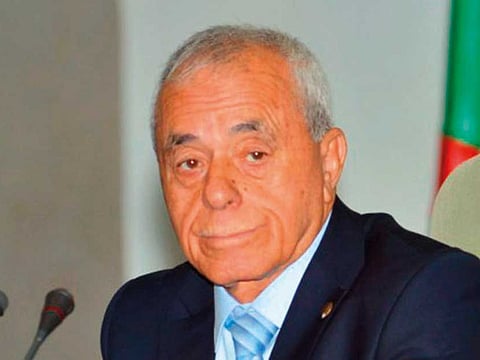A strange situation is emerging in Algeria
Parliament frozen as deputies, assembly president clash

Manama: Since it has hosted Algeria’s parliament in 1977, the Zighoud Yousuf Palace has never seen so many twists and turns, and such an overdose of suspense and thrills as in these past few weeks.
The chairman of the lower house of the bicameral parliament, Said Bouhadja, has caused deputies, the political class and the public opinion to hold their breath by refusing to resign, despite growing pressure from his own party, the ruling National Liberation Front (FLN).
Several political blocs calling for his departure accuse him of mismanagement.
According to members of these blocs, Bouhadja was reproached, among other things, for having asked the secretary general of the lower house to give per diem and expenses to a person who was to accompany him for care abroad. But the secretary general refused to give the required amount, which prompted Bouhadja to dismiss him. Despite the insistence of these blocs, he refused to reinstate him, sparking the crisis.
However, Bouhadja who has been the president of the National People’s Congress (NPC) since May 2017 has rejected the allegations, and argued they were illegal and insisted his leadership was both legal and constitutional.
The dispute, compounded by regular protests, has led to legislative paralysis. Bouhadja has the constitution and the parliament bylaws on his side, since they stipulate that the president of the lower house can be replaced only if he dies or is physically incapacitated or if he resigns.
None of the three possibilities applies now, and the 80-year-old Bouhadja is determined to hold on to his post for the duration of his mandate — until 2022.
In the absence of workable initiatives and with no solution in sight, the situation is escalating and only President Abdul Aziz Bouteflika can move forward by dissolving the parliament, under Article 147 of the constitution, and call for early elections within three months.
Some party leaders have been eyeing the option and have urged Bouteflika, the head of the FLN, to go ahead and dissolve parliament.
But Bouhadja has remained defiant.
“As long as the President does not ask me to resign, I will continue my mission until the end. If the freeze within the parliament continues, we will take the exceptional measures provided by the law,” he told a local daily last week.
“I am a supporter of alternation in power, provided it is within a legal framework. I also support the rule of law, so it is impossible for me to bow to a primitive movement that wants to freeze the activities of the parliament and undermine the stability of the institution.”
Bouhadja attributed the pressure on him to resign to the reforms he had introduced in the lower house, which seem to have annoyed deputies from some of the political formations that had initially supported him and helped him win the presidency.
“When I assumed the responsibility, I found deputies who had taken up to five vehicles. I put an end to this anarchy and I also banned recruitments after finding a surplus of a hundred employees,” he said.
In his analysis of the president’s silence on the crisis, Bouhadja did not rule out a test of his aptitude for leadership.
“Maybe this is a test to see if I will give in to an illegal movement and so will not live up to my position as the head of the parliamentary institution. Maybe, the president is trying to see how far the party leader, at the root of this crisis, will go.”
He also ruled out any link between the crisis and the presidential elections next year.
Algerian political analyst Ghaniya Oukazi said it was never easy to find a fair, reasonable and convincing explanation for political upheavals, especially when they occur in a situation where decision-makers seem to be looking for an alternative that allows them to retain power and be able to convince people of their will to “do well” and “serve the nation”.
But she added the tussle between Bouhadja and the deputies could be closely linked to presidential elections in 2019.
“The reproach to the president of the NPC is not so serious as to provoke such an outcry,” she told Gulf News.
“Bouhadja’s obstinacy has several readings. One speculation that I reject as erroneous is that he wants to stand up to the deputies and consequently to the President. This does not make sense since Bouteflika placed him in his current post.”
Another speculation is that the deputies are keen on continuing the wave of changes that have been made across the state over the last few months, she added.
“Ahead of the elections, they want to see important institutional changes. Many changes in the high civil and military functions were made during the summer. Now, they want to change the personnel that revolve around the presidency,” Ghaniya said.
Between the robust determination of Bouhadja, who despite his age is hard as nails, to remain in power and the strong resolve of his opponents to oust him, Algerians are scanning the horizons for clues to understanding one of the strangest situations in the modern history of their country.



